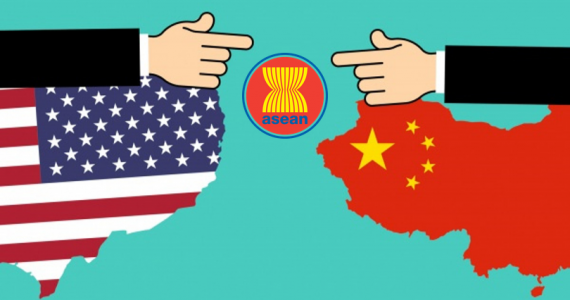
USA-ASEAN-CHINA. Foto has taken from www. ifair.eu
STRATEGIC ASSESSMENT. “Shocking and perilous” incidents could happen between China and the United States in the next couple of years, a former Chinese ambassador to Washington has warned.
Cui Tiankai, who served as envoy to the US from 2013 to 2021, said he had observed a significant deterioration in opinions about China among the American public during his term. The negative changes in Washington’s China policy would continue for several more years, he forecast.
According to Michael Vatikiotis, a senior adviser at the Centre for Humanitarian Dialogue and author of “Blood and Silk: Power and Conflict in Modern Southeast Asia” on Nikkei Asia, while China and the United States are now expending considerable time and energy applying pressure on countries in the region to join their respective sides, the two largest powers could more usefully collaborate to help resolve regional challenges and contribute to economic growth.
Instead of competing for primacy, Beijing and Washington could instead focus on joint regional approaches to addressing the conflict in Myanmar, which is rapidly intensifying and threatens to precipitate a regional refugee crisis.
In the South China Sea, Sino-U.S. tensions are polarizing littoral states that should be moving toward closer cooperation on combating illegal fishing and sharing data on disappearing fish stocks.
The Association of Southeast Asian Nations should urgently meet with the United States and China, alongside Japan, South Korea, India and Australia to discuss regional security risks. The goal should be to reframe the security architecture of the region.
The ASEAN-Indo-Pacific Forum that Indonesia plans to hold in Jakarta in September could be used to launch the process. To turn better intentions into sustained concrete action will require greater focus and political will on the part of Asian states to resist the temptation of alignment. China and the United States, for their part, should seize opportunities for joint dialogue in the regional setting.
Many people believe that the competition between China and the United States could spell the end of Western dominance. China has its own views on its competition “against” the United States, which Chinese Foreign Affairs Minister Qin Gang said at the Lanting Forum international event in Shanghai last week.
There were accusations in the forum that the West, specifically the United States, was imposing a modernization and development model. What emerged from the Lanting Forum — an event attended by approximately 300 participants from 80 countries — reaffirmed that the United States and China are competing in a variety of fields, ranging from military to economic to technological.
Making sure that development proceeds smoothly and that people’s welfare rises is a top priority for a middle-sized nation like Indonesia. Parties who provide needed assistance will become partners. In the midst of the competition between the two giant powers, ideology is no longer the primary factor in determining alignments.
At the opening of the Lanting Forum in Shanghai, China, on Friday, Chinese Foreign Affairs Minister Qin Gang said that there has been rhetoric recently accusing China of wanting to challenge the global order through violence, coercion, and conflict.
This impression developed as tensions over Taiwan’s independence grew more intense. It is believed that China is interfering with the peace and stability of the Taiwan Strait. “Such accusations go against the common sense of international relations.
It is an absurd logic and the consequences are very dangerous,” said Qin Gang. “Modernization of China and the World” was the theme of the forum, which drew 300 participants from the government, business, academia, and international organizations.
The event covered a wide range of topics, including the idea of Chinese-style modernization, China’s offer to promote a more equitable global development, and ways to improve China’s relations with the United States and other Western nations. He argued that China’s offer of modernization to the world was not meant to upend the conventional wisdom about the global order, which had up until that point been dominated by Western countries.
Australian think tank Lowy Institute in the “Asia Power Snapshot: China and the United States in Southeast Asia” reported that China has extended its influence in Southeast Asia in the last five years, beating the United States. The United States has continued to lose influence over China across four measures of strength: economic relations, defense network, diplomatic influence, and cultural influence since 2018.
The United States has lost its most influence since 2018 in Malaysia, with seven points, followed by Brunei and Indonesia with five points each.
“Beijing’s influence is strongest in Laos, Cambodia, and Myanmar, where geographic proximity and relatively weak U.S. engagement have allowed China to outstrip Washington’s influence by large margins,” the report said. While the United States is close to the Philippines, there has been a decline in its influence there since 2018 mainly driven by weaker economic transactions such as in trade and investment, said the report.





